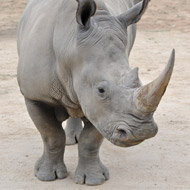Discovery offers hope for northern white rhino

There are currently only two northern white rhinos remaining in the world.
The northern white rhino could be saved from extinction by using the genes of its less-threatened southern cousin, according to new research.
The discovery was made by researchers from Cardiff University and the University of Venda, South Africa, following a genetic analysis of 232 rhino samples.
Researchers found that despite the northern and southern populations splitting around one million years ago, they have occasionally shared genes during cold and arid periods - as recently as 14,000 years ago when African grasslands expanded.
“By looking at the white rhino’s population history we’ve been able to establish that there was contact between northern and southern rhino populations throughout history,” said Dr Isa-Rita Russo from Cardiff University.
“This is an exciting find! Genetic proof of contact between the populations suggests it may be possible to successfully rescue the northern white rhinoceros using southern white rhinoceros genes to create embryos, although further data would need to be collected to confirm this.”
There are currently only two northern white rhinos remaining in the world - females Fatu and Najin reside in Kenya’s Ol Pejeta Conservancy. The last remaining male, Sudan, died in March 2018, leaving the species teetering on the brink of extinction.
The southern population declined to its lowest number around the turn of the nineteenth century but has since recovered to become the world’s most numerous rhino. They can be found mostly in South Africa, with smaller populations also in Namibia, Kenya and Zimbabwe.
Professor Yoshan Moodley, University of Venda, said: “It appears that the white rhinoceros is no stranger to low genetic diversity, as our results show that the species was subjected to several climatically and anthropogenically driven population declines, which would have reduced and compressed genetic diversity in the past.
“This is one of the few large animals to survive the last ice age, and it seems that the additional human pressure on an already genetically compromised species has pushed the white rhinoceros further along the road to extinction.”



 RCVS Knowledge has welcomed Professor Peter Cockcroft as editor-in-chief for Veterinary Evidence.
RCVS Knowledge has welcomed Professor Peter Cockcroft as editor-in-chief for Veterinary Evidence.